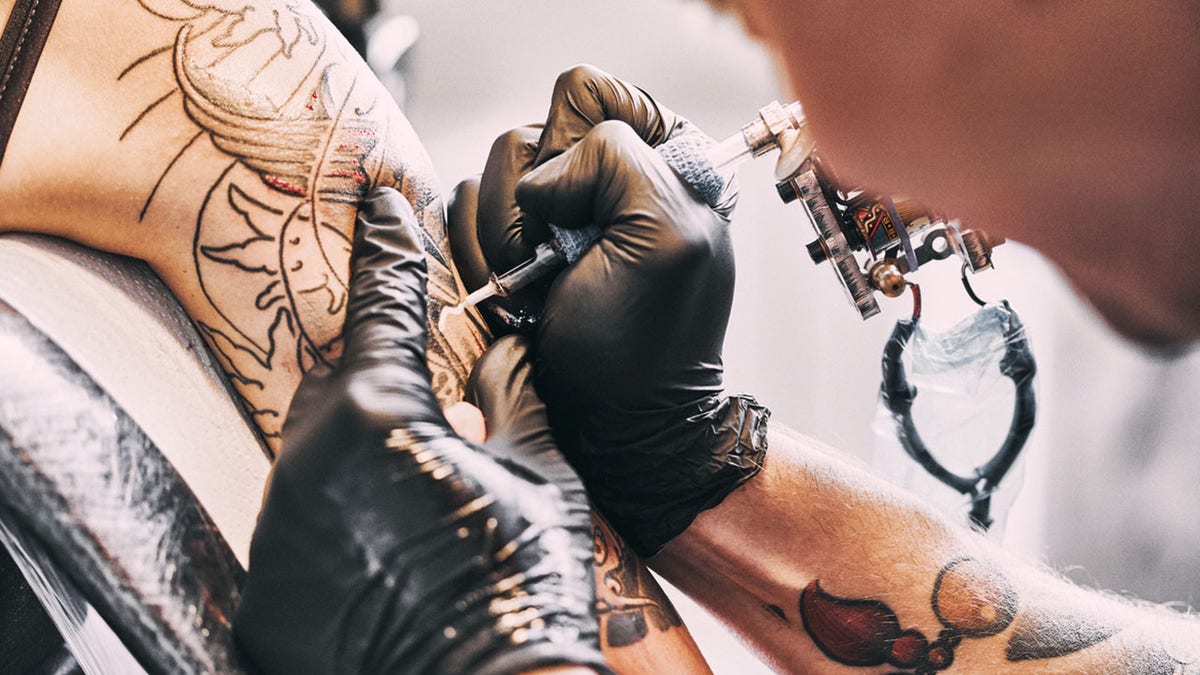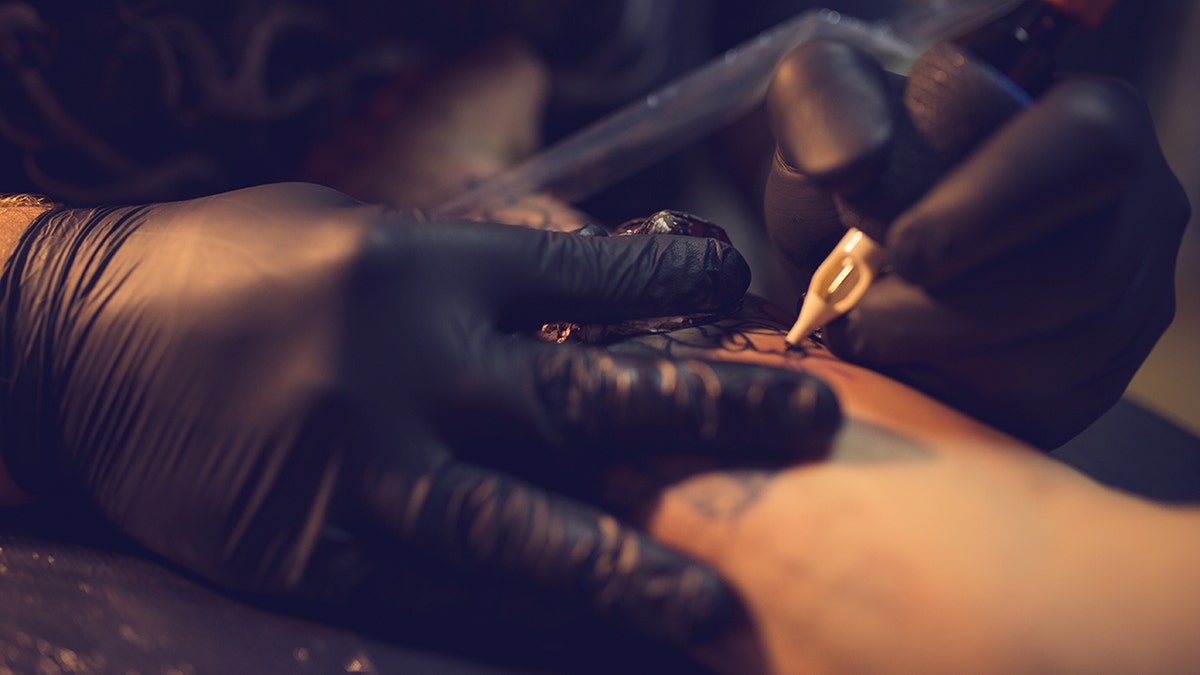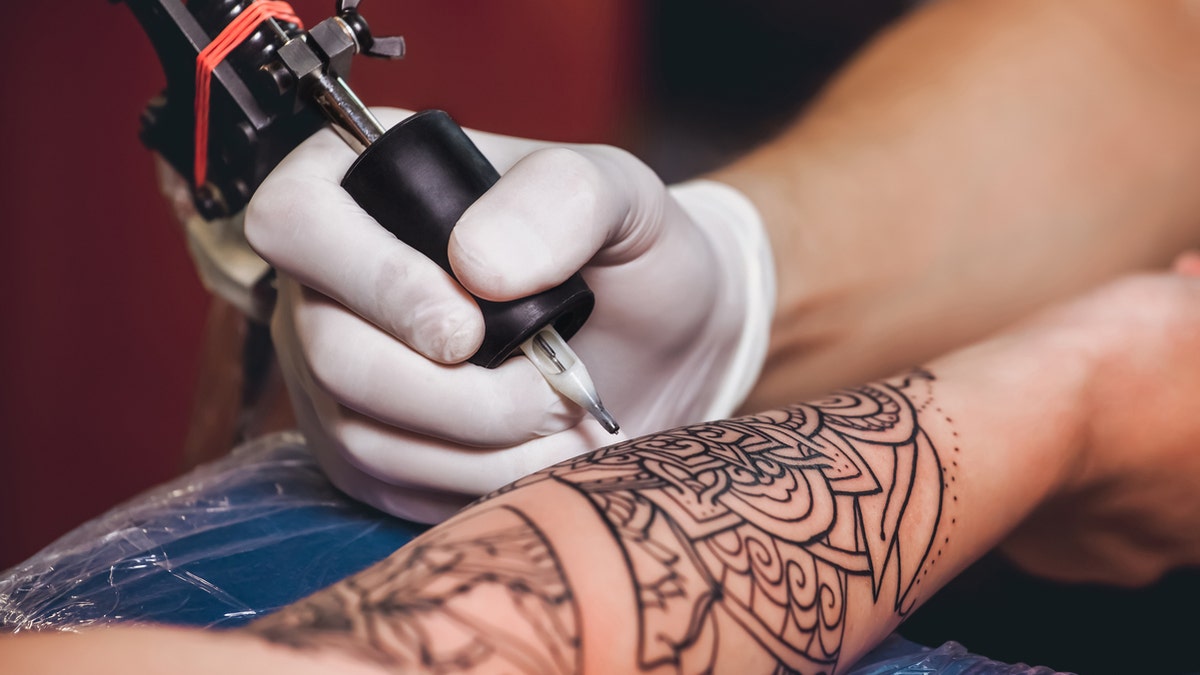How to remove a tattoo: The options, risks and costs associated with the procedure
When the day comes where your tattoo just doesn't look as good as it used to, there are a couple options and risks to consider when looking for a removal.
New York Yankees relief pitcher Aroldis Chapman will be taking time off to recover from an infection he reportedly received from a tattoo.
Fans discovered Chapman’s need for recovery from a tweet the Yankees sent out on Saturday, Aug. 27.
"Prior to tonight’s game, the Yankees placed LHP Aroldis Chapman on the 15-day injured list (retroactive to 8/24) with an infected wound from a recent tattoo," the MLB team wrote.
YANKEES' AROLDIS CHAPMAN SIDELINED WITH 'PRETTY BAD INFECTION' FROM TATTOO

New York Yankees pitcher Aroldis Chapman reacts while he waits to be taken out during the ninth inning of a baseball game against the Toronto Blue Jays, Friday, Aug. 19, 2022, in New York. (AP Photo/Adam Hunger)
A detailed report from FOX Sports states that multiple sources have confirmed that Chapman, 34, felt irritation on his leg, where a tattoo was recently placed.
Yankees manager Aaron Boone recently spoke about the infection before his team played against the Oakland Athletics, according to FOX Sports.
Boone had revealed that Chapman had gotten a tattoo earlier in the week, but his infection ultimately led him to be hotel-bound Friday and Saturday, FOX Sports reported.
"He got a pretty bad infection," Boone said before the game . "Hopefully he’s good in several days."
BETTER INSTRUCTIONS FOR TATTOO CARE COULD PREVENT INFECTIONS, DOCTORS SAY
Boone continued, "My focus is on trying to get him right."
Fox News Digital reached out to representatives of Chapman's for comment.
How common are tattoo-related infections?
Tattoo-related bacterial infections reportedly occur in people between 1% and 5%, according to a narrative review published in the National Library of Medicine in February 2022.
The review, which is titled "Viral Infections Confined to Tattoos," came straight from Medicina (Kaunas), a peer-reviewed scientific journal from the Lithuanian University of Health Sciences.
"Infections after tattooing can be caused by endogenous microorganisms, i.e., microorganisms that are part of the normal flora, as a result of altered skin barrier or exogenous microorganisms that enter the skin by inoculation during tattooing," researchers wrote in their review.
MAN DIES FROM FLESH-EATING BACTERIA AFTER SWIMMING WITH NEW TATTOO
While acknowledging that "epidemiological and clinical data regarding infections on tattoos are scarce," the review states that tattoos have been linked to clinical problems, such as immune reactions, inflammatory disorders, infections and skin cancer.

Tattoos are a form of body modification that involves the insertion of ink deposits under skin. (iStock)
Researchers wrote that tattoo-related infections are mostly caused by bacteria and only a few have resulted in localized viral infections, including molluscum contagiosum virus (MCV), human papillomavirus (HPV) and herpes simplex virus (HSV), according to documented records.
"In most cases, the lesions were strictly confined to the area of the tattoo," researchers wrote in their review.
How to keep yourself safe?
Even though tattoo-related infection stats indicate that most people have gotten and will continue to get tattoos without issue, there’s still a risk that it can happen.
Cleveland Clinic – a nonprofit American academic medical center – says tattoo infections can occur anytime a person receives a tattoo because the process involves thousands of small ink deposits beneath the skin via needle.
"Even if you go to an experienced tattoo artist and the shop looks clean and sterile, it can happen," the medical center’s Tattoo Infection resource webpage states.
TATTOO AFTERCARE WITH MEGAN MASSACRE
Cleveland Clinic continued, "There’s also a risk of infection with at-home tattoo kits and ceremonial tattoos that are part of cultural celebrations."

Tattoos may be known as a form of art, but they still come with infection risks, medical experts say. (iStock)
Infections can reportedly happen when tattoo ink is contaminated or contains ingredients that can cause allergic reactions, according to Cleveland Clinic.
Improperly sterilized or unsterilized tools and conditions are another common culprit.
"You should also ask your tattoo artist about the kind of ink they use and sterilization practices," Cleveland Clinic wrote. "They should wear gloves at all times and use sterile wipes to clean your skin before, during and after your tattoo."
The medical center also advises tattoo recipients to follow the tattoo aftercare instructions that are provided by the tattoo artist.
CLICK HERE TO GET THE FOX NEWS APP
CDC: Signs of tattoo-related infection (nontuberculous mycobacterial)
Mild: Inflammation, including rashes, papules and/or nodules
Severe: Abscesses
Tattoo-related nontuberculous mycobacterial skin infections are hard to treat and can require four to six months of treatment with prescription drugs, according to the CDC.
In some cases, the Centers for Disease Control and Prevention (CDC) wrote that surgery might be required to remove infected tissue.
Precautions the CDC recommends people take before they get a tattoo include seeking out services from tattoo parlors that are registered or approved by their local jurisdiction, requesting that a tattoo artist only use ink specifically made for tattoos, ensuring that a tattoo artist follows a hygiene protocol while tattooing and notifying a medical professional right away if skin problems occur after getting a tattoo.

A 2019 Ipsos (market research company) poll estimated that one in three Americans have a tattoo. (iStock)
Other important details the CDC says tattoo customers should keep an eye out for include making sure their tattoo artist only uses tattoo-grade products, doesn't dilute ink before tattooing due to cross-contamination risks, only uses sterile water if ink dilution or tool rinsing is absolutely necessary and uses an aseptic technique while tattooing.
FOLLOW US ON FACEBOOK FOR MORE FOX LIFESTYLE NEWS
If a tattoo customer suspects that they’ve been infected, the CDC advises people should proceed by notifying their tattoo artist and the Food and Drug Administration's MedWatch program.










































